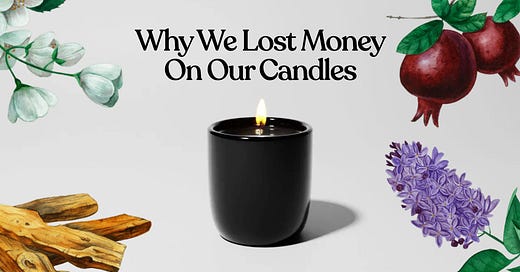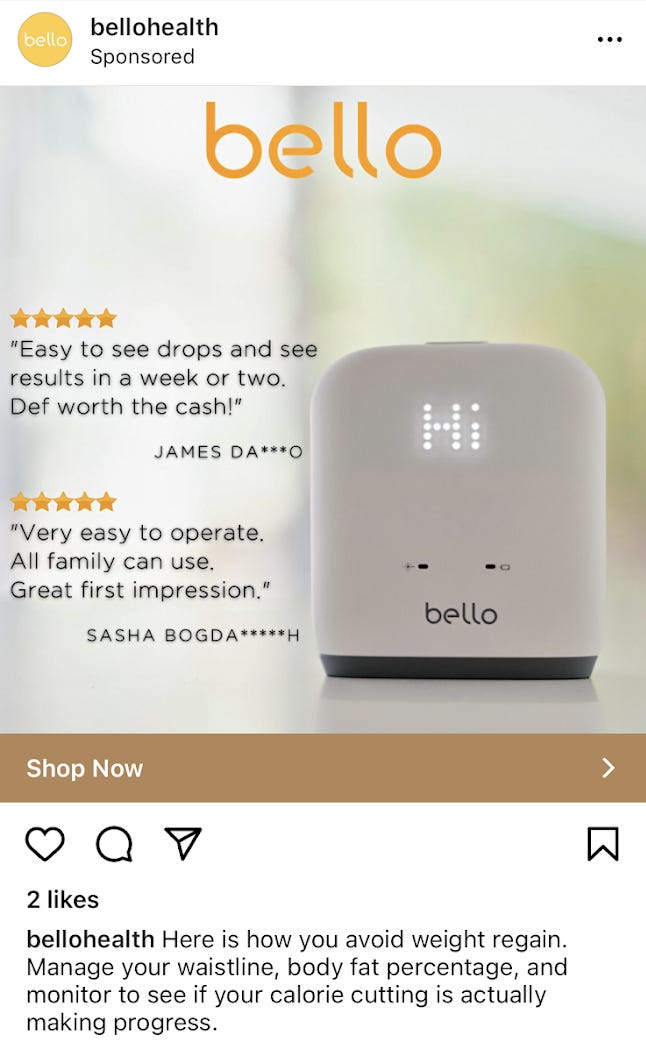A newsletter about branding, startups, and mission-driven companies aiming to make the world a better place.
👋 Welcome to For The Love, so happy to have you all here!
Today we’ll be discussing:
How sometimes losing money can be a good thing
A roundup of new launches this week, including a merch drop that’s out of this world
A new at home device that’s “def worth the cash,” according to James Da***o
If you were forwarded this by a friend, join over 2,100 other DTC enthusiasts by subscribing here!
💣 For The Love of Startups
It can be difficult to prioritize things that don’t yield immediate results.
This has been on my mind the past week, while experimenting with a new photo-sharing app, Dispo. Part of its appeal is that you don’t see any of the photos you’ve taken until 9 am the next day, completely at odds with how we’ve learned to interact with technology.
It can be tempting to take an instant gratification approach with brand building as well — prioritizing efforts that can immediately convert to sales.
But that’s not the way to build a brand with longevity — one that turns one-time customers into lifelong brand evangelists.
For that to happen, customers need to believe you understand them and have their best interests in mind.
Sometimes that means giving them what they want at a price they can’t help falling in love with, even if it means losing a little money in the process.
Italic is a modern apparel and home goods platform, also operating on a membership model, “connecting you to high-quality manufacturers and letting you shop at factory prices.”
They recently announced they had been losing money on every candle purchase.
Why? Because it’s something their customers were begging for, and they wanted to offer it at a fair price.
Founder Jeremy Cai explained to me that what’s most relevant to them is “are you happy? Are we delivering our value proposition, and savings to you enough that you're going to renew another year because that's really how we make money. The longer you stay with us, and hopefully the more value we can add to your life, the more money we make.”
This isn’t a new idea, however — but it is something we haven’t seen much from modern DTC brands that have been built to scale quickly.
One famous example of a loss leader is Costco’s $1.50 soda & hot dog combo.
In 1985, Costco started selling a hot dog and soda for $1.50, and it still costs $1.50 to this day. Have costs gone up? Yes. But they feel it’s worth the investment to keep their customers happy.
When CEO Craig Jelinek proposed to Costco co-founder Jim Sinegal’s that they raise the price, as they were losing money on each sale:
“If you raise the effing hot dog, I will kill you. Figure it out.”
He did figure it out (they started making their own hot dogs), and because of that, continued to build goodwill with their customers. Obviously, they make a ton of money in their core membership business, but it tells customers that Costco does everything in service of keeping costs low and not shaking them down for every last hot dog dollar.
Sometimes, giving something away for free isn’t so much about customer happiness as it is taking a longer-term view on investing in a market. Ten years earlier, on the other side of the Atlantic, two pioneering Frenchmen started a tire company, at a time when there were under 3,000 cars in all of France.
To encourage driving, they published a little red guide with maps, locations to refuel, instructions to change a tire, and, you guessed it...restaurants.
They gave the Michelin Guide away for free until 1920 when Andre Michelin apparently saw one of the guides being used to prop up a workbench and decided “man only truly respects what he pays for,” and started charging seven francs.
Another book that’s surpassed its original use as marketing material?
The Guinness World Records.
In 1951, the managing director of Guinness Brewery, Sir Hugh Beaver, missed a shot on a hunting trip and wondered what the fastest game bird was. To his surprise, he couldn’t find the information anywhere.
The first edition of the Guinness World Records was published in August 1955 — 50,000 *waterproof* copies distributed to pubs to promote Guinness Brewery. Due to massive popularity, by October they’d produced them for public purchase.
The fact that people don’t necessarily relate Michelin tires with the guide, or Guinness beer with the records, is in part because of their success — they are recognizable brands, and standalone businesses, unto themselves.
So do yourself a favor and think long-term — at the very least, you’ll have some very happy lifelong customers, and who knows, you might inspire someone to eat 72 hot dogs in under 10 minutes (at $1.50 apiece), or have an entirely new business.
🔥 For The Love of Newness
Some out of this world* merch in collaboration with the artist behind the Mars Perseverance logo. (*admittedly stole this joke from Emmett Shine)
“Bling Velour” from Topicals to channel your inner Paris Hilton.
The Shelf is a limited edition shop from Goldune, stocked with sustainable snacks.
Revisionary is a “collective of 21 emerging Black-owned brands across fashion, beauty, and lifestyle,” donating 10-20% of sales to non-profit organizations throughout Black History Month.
🔍 For The Love of the Details
Hi!
Here is how you avoid weight regain...
There it is. That’s the way. Right there.
How does it do this? Well, isn’t it obvious?
*Completely anonymous* Sasha (whose last name we will never ever be able to figure out) points out that the whole family can use it — and that it makes a great first impression.
Call us, a bit, skeptical and confused — so we went and checked out the product on Amazon for reviews.
We learned that it was a belly fat scanner — of course!
However, we were left even more confused than when we started when Giri suggested that the product makes it hard to track “subconscious fat”.
You know — the kind of fat you pick up when you go into a shared dream with Leonardo DiCaprio and he treats you to one too many croissants in a Paris cafe.
Thank you for being part of For The Love!
A few more things...
Is there a topic you think I should cover? Or a funny ad I can dissect? I’d love to hear from you! You can email me at info@ajasinger.com, respond to this email, or drop it in the comments ⬇
Know someone who’d enjoy this newsletter?
Was this newsletter forwarded to you?
Written by Aja Singer, a brand and creative strategy consultant interested in all things startup, mission-driven, and community. Born in Canada. Based in Brooklyn. You can also find me on Instagram and Twitter.







